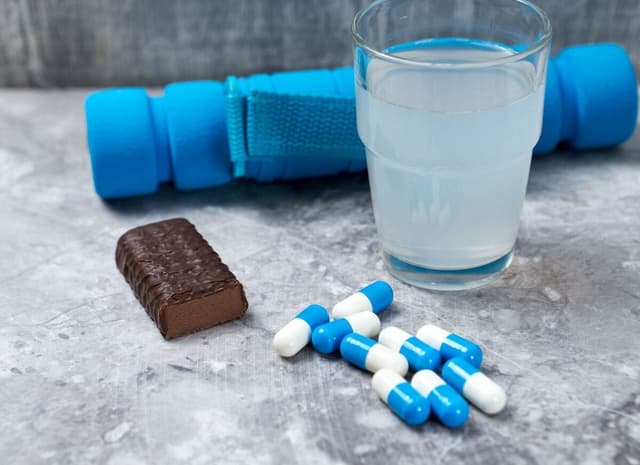When Is the Best Time to Take Creatine for Endurance and Strength?

October 1, 2024
When it comes to enhancing athletic performance, many fitness enthusiasts wonder about the best creatine practices to maximize their gains. Creatine supplementation has long been a staple in the strength training community, but timing can play a crucial role in its effectiveness. Whether you're aiming to boost your endurance or increase your strength, understanding when to take creatine can make all the difference. In this article, we'll delve into the optimal times to consume creatine for both endurance athletes and strength trainers, helping you get the most out of this popular supplement.
The Science Behind Creatine Timing
Creatine is a naturally occurring compound found in muscle cells, crucial for producing energy during high-intensity, short-duration exercises like weightlifting or sprinting. While many people focus on the type or brand to find the best creatine, the timing of ingestion can significantly impact its effectiveness. But when exactly is the optimal time to take creatine for maximum benefits?
Some studies suggest that taking creatine immediately before or after workouts can enhance its uptake into muscle cells due to increased blood flow and insulin sensitivity during these times. This means that consuming creatine around your training sessions could potentially lead to better absorption and improved performance outcomes.
For example, a study published in the Journal of the International Society of Sports Nutrition found that participants who took creatine post-workout experienced more significant increases in lean body mass and strength compared to those who took it pre-workout. This indicates that post-exercise might be the best time to take creatine for strength gains.
However, other research points out that the total daily intake of creatine is more important than timing. Since creatine accumulates in the muscles over time, consistent daily supplementation can saturate muscle stores regardless of when it's taken. This suggests that the best creatine routine might simply be the one that you can adhere to consistently.
Furthermore, for endurance athletes, timing may play a different role. Taking creatine with carbohydrates could enhance absorption due to insulin-mediated uptake. Therefore, consuming creatine during meals might be beneficial.
So, while the science isn't entirely conclusive, timing your creatine intake around workouts or with meals could offer slight advantages. Ultimately, understanding how creatine works and how your body responds is key to finding the best creatine schedule for you.
Debunking Myths About Creatine Timing
When it comes to creatine supplementation, numerous myths and misconceptions can cloud the judgment of even the most informed athletes. Let's address some common questions and challenges to help you make the best creatine decisions for your fitness journey.
Myth 1: Creatine Must Be Taken Pre-Workout for Effectiveness
Many believe that taking creatine right before a workout provides an immediate energy boost. However, creatine doesn't work like a stimulant. Instead, it saturates your muscle cells over time. While taking it pre-workout isn't harmful, expecting immediate performance enhancement may lead to disappointment.
Myth 2: Timing Doesn't Matter At All
On the flip side, some argue that timing is irrelevant. While it's true that consistent daily intake is crucial, timing can still play a role in maximizing absorption. For instance, taking creatine post-workout may be slightly more effective due to increased insulin sensitivity, aiding in better uptake by muscle cells.
Myth 3: Loading Phases Are Necessary
The concept of a "loading phase" involves taking a high dose of creatine for a short period to quickly saturate muscle stores. While this can expedite the process, it's not mandatory. A regular daily dose will achieve the same saturation over time without the potential side effects of bloating or gastrointestinal discomfort.
Myth 4: Creatine Causes Water Retention Only in Muscles
Some worry that creatine will cause them to look bloated due to water retention. While creatine does draw water into muscle cells, this intracellular hydration can actually enhance muscle volume and appearance. Proper hydration is essential, but the best creatine practices focus on muscle health, not just aesthetics.
Addressing Misconceptions with Research
A study in the European Journal of Applied Physiology found no significant difference in muscle creatine levels whether the supplement was taken in the morning or evening. This supports the idea that total daily intake is more critical than precise timing, helping dispel the myth that there's a strict window for consumption.
By debunking these myths, it's clear that while timing can have minor effects, the most important factor is consistent daily supplementation. Understanding these nuances allows you to tailor your creatine intake to your lifestyle, ensuring you get the best creatine results without falling prey to common misconceptions.
How to Optimize Your Creatine Intake for Endurance and Strength
Now that we've explored the science and dispelled common myths, let's dive into practical steps to make the most of your creatine supplementation. Whether you're aiming for endurance or strength, here's how to optimize your creatine intake:
1. Choose the Right Type of Creatine
While there are various forms available, creatine monohydrate is the most researched and widely recommended. It's effective, affordable, and considered the best creatine form for most users.
Our Top Recommendations

Optimum Nutrition Micronized Creatine Monohydrate Powder
Micronized for easy mixing, supports muscle growth and endurance.
See on Amazon$0.35 per 5g serving

Nutricost Creatine Monohydrate Micronized Powder
Third-party tested, non-GMO, 5g of pure creatine per serving.
See on Amazon$0.2 per 5g serving

NSF Certified, supports muscle power and recovery.
See on Amazon$0.46 per 5g serving

ProMix Creatine Monohydrate Powder
Micronized, additive-free, ideal for performance and recovery.
See on Amazon$0.36 per 5g serving

NOW Foods Sports Nutrition Unflavored
100% pure creatine, GMP certified, boosts strength and endurance.
See on Amazon$0.2 per 5g serving
2. Determine the Appropriate Dosage
- Standard Dose: 3-5 grams per day is sufficient for most people to maintain muscle creatine saturation.
- Loading Phase (Optional): If you prefer quicker saturation, take 20 grams per day divided into four doses for 5-7 days, then continue with the standard dose.
3. Timing Your Intake
- Post-Workout: Consuming creatine after your workout can enhance absorption due to increased insulin sensitivity.
- With Meals: Taking creatine with a meal containing carbohydrates and protein may further boost uptake.
- Consistent Daily Intake: If timing isn't convenient, focus on taking it at the same time each day to build a routine.
4. Stay Hydrated
Creatine draws water into muscle cells, so it's crucial to maintain proper hydration:
- Drink Plenty of Water: Aim for at least 8-10 glasses of water daily.
- Monitor Urine Color: A light yellow color typically indicates good hydration.
5. Combine with a Balanced Diet
- Nutrient-Rich Foods: Ensure your diet supports your fitness goals with adequate protein, carbs, and healthy fats.
- Avoid Excessive Caffeine: High amounts of caffeine may counteract creatine's benefits.
6. Track Your Progress
- Keep a Workout Journal: Note your performance, energy levels, and any changes in strength or endurance.
- Adjust as Needed: If you don't notice improvements after a few weeks, consider tweaking your dosage or timing.
7. Consult a Professional
- Speak with a Nutritionist or Trainer: Personalized advice can help tailor the best creatine strategy for your needs.
- Consider Medical Conditions: If you have underlying health issues, consult a doctor before starting supplementation.
Implementing These Steps
By following these guidelines, you can enhance the effectiveness of your creatine supplementation. Remember, the best creatine routine is one that aligns with your goals and fits seamlessly into your lifestyle. Consistency and adherence are key to reaping the full benefits.
Creatine supplementation can be a powerful tool in boosting both endurance and strength when used effectively. While the timing of intake can offer slight advantages, the most critical factors are consistency and finding a routine that works for you. By understanding the science, debunking common myths, and implementing practical strategies, you're well on your way to optimizing your performance.
Remember, the best creatine practices involve choosing the right type, maintaining proper dosage, and aligning your intake with your fitness goals. Whether you decide to take it post-workout, with meals, or at a consistent time each day, the key is to be consistent and attentive to how your body responds.
Ready to take your training to the next level? Start implementing these tips today and experience the difference creatine can make in your endurance and strength gains. Don't forget to check out our other articles!






